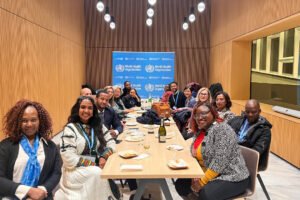
𝐂𝐨-𝐂𝐫𝐞𝐚𝐭𝐢𝐨𝐧 𝐰𝐨𝐫𝐤𝐬𝐡𝐨𝐩 𝐭𝐨 𝐢𝐝𝐞𝐧𝐭𝐢𝐟𝐲 𝐜𝐨𝐧𝐭𝐞𝐱𝐭 𝐬𝐩𝐞𝐜𝐢𝐟𝐢𝐜 𝐢𝐧𝐭𝐞𝐫𝐯𝐞𝐧𝐭𝐢𝐨𝐧𝐬 𝐭𝐨 𝐫𝐞𝐝𝐮𝐜𝐞 𝐢𝐦𝐦𝐮𝐧𝐢𝐳𝐚𝐭𝐢𝐨𝐧 𝐝𝐫𝐨𝐩𝐨𝐮𝐭𝐬: 𝐚𝐧 𝐈𝐦𝐩𝐥𝐞𝐦𝐞𝐧𝐭𝐚𝐭𝐢𝐨𝐧 𝐑𝐞𝐬𝐞𝐚𝐫𝐜𝐡
CDHi- Center for Digital Health and Implementation Science at the University of Gondar in collaboration with JSI and Ministry of Health is conducting an implementation research aimed at reducing immunization dropout at 9 month touch point in Ethiopia at three intervention woredas in Afar, Amhara & Oromia regions. We have conducted the baseline study that identified key barriers and gaps in the program implementation.
Following the baseline study, we have conducted national and woreda-specific Co-Creation Workshops to identify tailored interventions and implementation strategies that aim to address the problem. This is one of the key parts of the research as it identifies contextually appropriate evidence-informed interventions and strategies.
At the national level co-creation, experts from the Ministry of Health, Regional Health Bureaus and intervention woredas, as well as from JSI and CDHI-UoG convened for three days April 1–3, 2025 to collaboratively design effective community-driven strategies based on the baseline evidence.
During this national co-creation, several key activities including discussions on key findings of the baseline study, identifications of interventions for specific woredas, and tailored implementation strategies were discussed, refined and agreed through a prioritization process.
Following this, woreda-level co-creation was conducted at one of the intervention woredas, Gelalo woreda of Afar by engaging key immunization actors; mothers or caregivers, fathers, grandparents, community and religious leaders, vaccinators, health extension workers, EPI focals, and health center and woreda health office heads to:
🔹 Discuss and validate baseline study findings
🔹 Identify local barriers and enablers towards uptake of vaccination services
🔹 Ideation and refinement of localized solutions through community insight
🔹 Design a tailored action plan with clear activities
The identified interventions and strategies will undergo refinement by the research team before the kick-off of the implementation.
We will conduct the remaining woreda-level co-designing workshops at Gondar Zuria and Didessa woredas in the coming few weeks. These workshops will serve as a platform for organizing and refining the implementation strategies, ensuring that each intervention and implementation strategies are aligned with the specific barriers before implementation starts.
The research team will then work together to finalize the strategies, identify key actions, and set clear timelines, marking the official start of the implementation phase .



